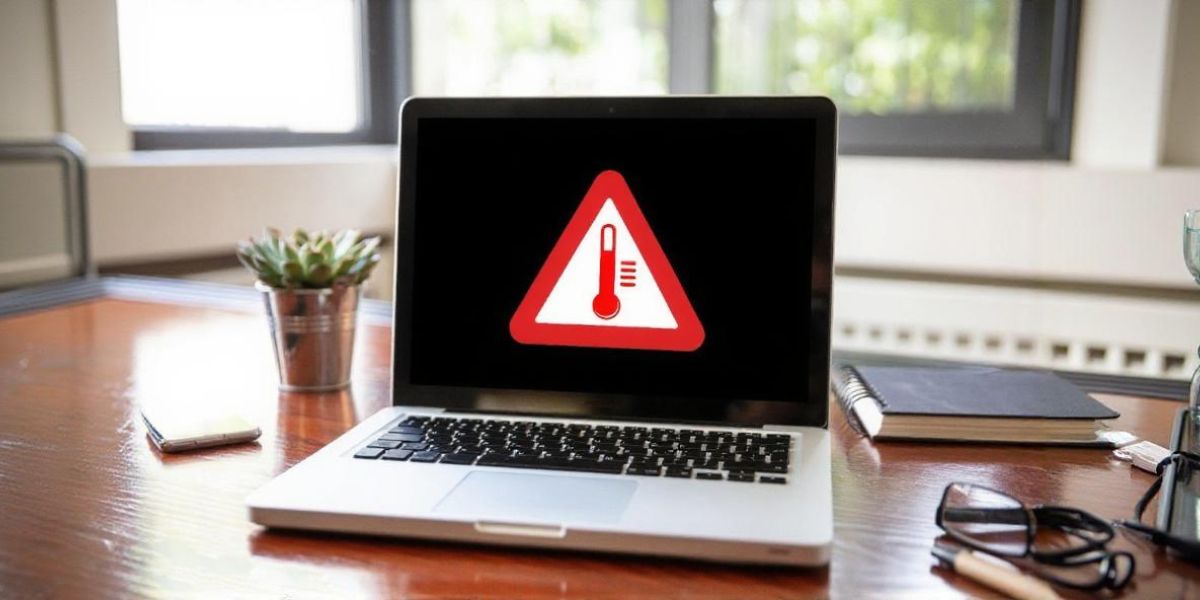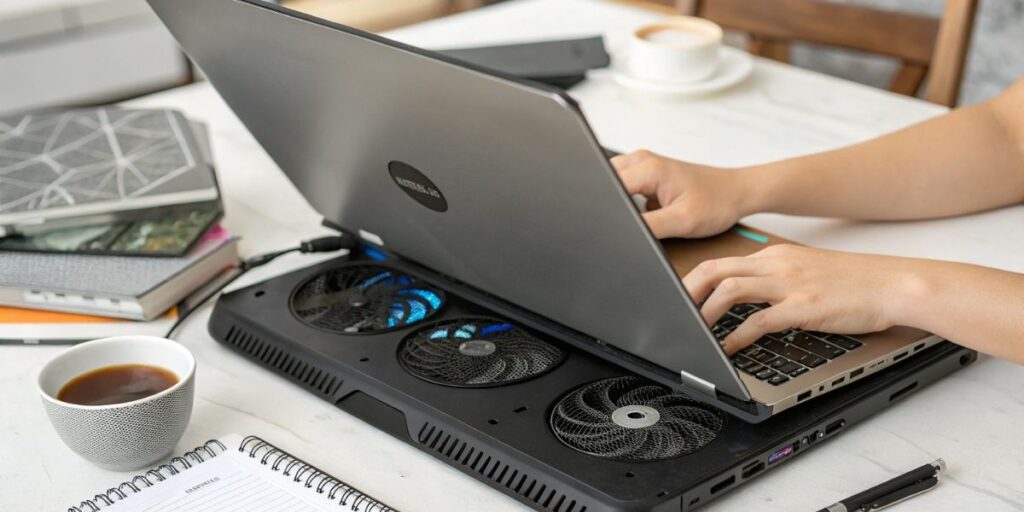Laptop Overheating Fixes: Extend Its Lifespan Easily

Keeping your laptop cool isn’t just about comfort; it protects performance, prevents unexpected shutdowns, and helps the hardware last longer.
Below you’ll find practical, low-risk steps you can take today, plus a few deeper fixes if the problem persists. Everything here is written for everyday users, with options for Windows and macOS.
Know the Signs Before Damage Happens
Common Symptoms to Watch
- Fans spinning loudly for long periods
- Sudden slowdowns or stuttering during basic tasks
- The chassis feels hot to the touch, especially near the vents
- Apps crashing or the laptop shutting down unexpectedly
Why Does Heat Hurt Performance?
Modern processors automatically slow themselves when temperatures run high. This “thermal protection” prevents damage, but it also means a sluggish laptop. Intel documents maximum operating temperatures (Tjunction) and explains that CPUs limit performance as they approach those limits.
Fast Fixes You Can Do Today
Give It Space to Breathe
Place your laptop on a hard, flat surface so air can flow through the vents. Avoid bedding, cushions, or anything that blocks the hinge or underside. Apple’s guidance is clear on keeping vents unobstructed and using a stable, well-ventilated surface.
Quick Checklist
- Use a desk or stand, not a duvet or lap, for long sessions
- Keep the rear hinge area and side vents clear
- Don’t cover the keyboard while the laptop is running
Clean The Vents and Fans (No Disassembly Required)
Dust is a top cause of rising temperatures. Power down and unplug the laptop, then use short bursts of compressed air at the vents to move dust out. If you’re comfortable with basic maintenance, follow a reputable step-by-step guide for deeper cleaning. Many references provide clear, photographed instructions for fan cleaning.
Tip: Hold the fans still with a plastic tool or toothpick while using compressed air to avoid overspinning.
Adjust Power and Performance Settings (Windows)

High-performance modes draw more power and generate more heat. Switching to Balanced or Best power efficiency reduces background activity and heat output while keeping the system responsive. Microsoft’s support pages outline where to change Power mode and related options in Windows 11.
Update The OS, Drivers, and Firmware
Manufacturers often release thermal and fan-control improvements via updates. Dell, for example, recommends keeping drivers and utilities current and explains how its tools manage thermal behaviour. Regular updates can prevent overheating and fan noise from recurring.
Close Background Apps and Cut Unnecessary Startups
Heavy background tasks, cloud syncs, multiple browser tabs, auto updaters, and add constant load. Use Task Manager (Windows) or Activity Monitor (macOS) to spot hungry processes and disable unneeded startup items. Microsoft also notes that trimming background activity supports cooler, more efficient operation.
Use The Maker’s Thermal Tools
Many brands include utilities to manage fan curves and performance profiles:
- Dell Power Manager / Optimiser lets you prioritise cooler operation.
- ASUS Armoury Crate / MyASUS provides troubleshooting and performance/fan modes.
- Lenovo Vantage offers thermal modes on supported models.
External Cooling Helps
A sturdy laptop stand or a quality cooling pad can improve airflow under the chassis. If you’re searching for the best ways to cool laptop setups, start with a simple stand that tilts the device to expose the intake vents more effectively.
Preventive Care That Pays Off
Routine Maintenance
- Blow out the vents every few months, more often in dusty spaces
- Keep liquids and food away from the keyboard and vents
- Store and use the laptop in a cool, shaded area
These straightforward steps are among the most effective ways to prevent laptop overheating over the long term.
Good Charging Habits
Heat rises while charging. Give the underside room to breathe and avoid stacking external drives or accessories on the chassis. If the device gets uncomfortably warm, pause heavy tasks until it cools.
Mind Your Environment
High ambient temperatures reduce cooling headroom. Even a slight drop in room temperature can help stabilise performance during long sessions.
If Problems Persist, Try These Deeper Fixes
Service the Cooling System
Old thermal paste, clogged heatpipes, or a failing fan can all trigger common laptop overheating problems. If you’re out of warranty and confident with repairs, use a trusted teardown guide for your exact model.
Otherwise, book a professional service, especially if you hear grinding or rattling from the fan, or the system shuts down under load. HP’s support also flags fan faults and BIOS updates as part of overheating remediation.
Tune Performance Profiles for Your Workload
If you only browse and write documents, a cooler ‘Balanced’ profile is ideal. For gaming or rendering, use a performance mode temporarily and keep the laptop well-ventilated. Armoury Crate’s guidance explains how modes change wattage and fan response on supported ASUS laptops.
When to Get Hands-On Help (Mid-Blog Check-In)
If you’ve tried the steps above and temperatures remain high, it’s time for a diagnostic. Fone Tech Redditch, the most reliable tech repair shop in Redditch, can assess cooling hardware, clean internals safely, and advise on part replacements where needed.
How to Stop a Laptop from Overheating?
- Keep vents clear and use a flat, hard surface
- Clean dust from vents/fans with compressed air
- Switch to Balanced or Best power efficiency when appropriate
- Update Windows/macOS, drivers, and firmware regularly
- Use the manufacturer’s thermal tools to set cooler profiles
- Add a stand or cooling pad for better airflow
- Reduce background apps and heavy multitasking
- Seek professional service if fans are noisy or shutdowns occur
These are practical, low-risk steps anyone can follow, exactly how to stop a laptop from overheating without voiding warranties or risking component damage.
Final Thoughts
Heat is the enemy of stable performance and long hardware life, but you can bring temperatures under control with simple changes: better airflow, sensible power settings, routine cleaning, and up-to-date software. If you still struggle with high temps or sudden shutdowns, don’t leave it to chance. For expert laptop repair in Redditch, contact Fone Tech Redditch for a complete thermal health check, professional cleaning, and dependable repairs.


Leave a Reply